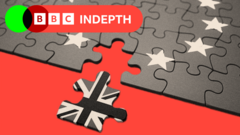Political leaders are divided on whether a forthcoming UK-EU summit signifies a progressive relationship or a risky retreat from Brexit ideals.**
UK Eyes New Path: Re-engagement with the EU Amidst Hurdles**

UK Eyes New Path: Re-engagement with the EU Amidst Hurdles**
As the UK prepares for a key summit with the EU, debates swirl over the implications of enhanced cooperation post-Brexit.**
In a significant diplomatic setting, discussions at Lancaster House in London have sparked speculation about the UK's evolving relationship with the EU, as political leaders gather to address urgent European security and economic issues. With the upcoming UK-EU summit scheduled for May 19 marking a pivotal moment since Brexit, the Labour government sees an opportunity to reinstate regular high-level interactions with EU counterparts.
The backdrop of Lancaster House—echoing the historic ties between the UK and Europe—serves to emphasize the ongoing importance of cooperation. UK Foreign Secretary David Lammy highlighted the agenda including responses to the war in Ukraine and proposing a UK-EU security partnership, a legacy from previous Brexit negotiations that was sidelined during Boris Johnson’s administration.
The stark division among policymakers reveals the stakes surrounding this summit. While Labour leaders hopeful for a new "partnership" celebrate the potential for reinforced relations, Conservative voices claim it may signal the "surrender" of Brexit outcomes. They argue a pioneering security agreement could undermine national sovereignty and that the UK's military reliance should rest purely on NATO.
Conversely, proponents point to significant economic prospects that a security pact could deliver, citing potential financial access through initiatives like the EU’s €150bn SAFE program aimed at defense project financing. The expectation among industry leaders is for a revitalization of the UK’s defense capabilities to meet escalating demands in the wake of geopolitical struggles.
In tandem, negotiations toward a 'veterinary deal' which aims to alleviate stringent border checks for food exports is generating hope among UK businesses, targeting efficiency and lower costs. However, aligning regulations with EU standards poses a significant political risk and is greeted with skepticism from opponents who see it as a dilution of the promises made during the Brexit campaign.
Beyond these discussions, ideas such as a youth mobility scheme for under-30s to live and work across UK and EU borders introduce potential changes to immigration policy. Though some fear these moves might resemble a reintroduction of free movement, Labour asserts that any measures would be tightly controlled.
As the political narrative unfolds, contrasting viewpoints reflect the complexity of navigating Britain's post-Brexit relationship with Europe. While Labour pushes for pragmatic solutions to "make Brexit work," critics remain vigilant, warning of a looming return to EU adherence.
With expectations for a critical summit rising, British leaders must weigh the opportunities for collaboration against the foundational tenets pledge during Brexit to retain control over national policies.
The backdrop of Lancaster House—echoing the historic ties between the UK and Europe—serves to emphasize the ongoing importance of cooperation. UK Foreign Secretary David Lammy highlighted the agenda including responses to the war in Ukraine and proposing a UK-EU security partnership, a legacy from previous Brexit negotiations that was sidelined during Boris Johnson’s administration.
The stark division among policymakers reveals the stakes surrounding this summit. While Labour leaders hopeful for a new "partnership" celebrate the potential for reinforced relations, Conservative voices claim it may signal the "surrender" of Brexit outcomes. They argue a pioneering security agreement could undermine national sovereignty and that the UK's military reliance should rest purely on NATO.
Conversely, proponents point to significant economic prospects that a security pact could deliver, citing potential financial access through initiatives like the EU’s €150bn SAFE program aimed at defense project financing. The expectation among industry leaders is for a revitalization of the UK’s defense capabilities to meet escalating demands in the wake of geopolitical struggles.
In tandem, negotiations toward a 'veterinary deal' which aims to alleviate stringent border checks for food exports is generating hope among UK businesses, targeting efficiency and lower costs. However, aligning regulations with EU standards poses a significant political risk and is greeted with skepticism from opponents who see it as a dilution of the promises made during the Brexit campaign.
Beyond these discussions, ideas such as a youth mobility scheme for under-30s to live and work across UK and EU borders introduce potential changes to immigration policy. Though some fear these moves might resemble a reintroduction of free movement, Labour asserts that any measures would be tightly controlled.
As the political narrative unfolds, contrasting viewpoints reflect the complexity of navigating Britain's post-Brexit relationship with Europe. While Labour pushes for pragmatic solutions to "make Brexit work," critics remain vigilant, warning of a looming return to EU adherence.
With expectations for a critical summit rising, British leaders must weigh the opportunities for collaboration against the foundational tenets pledge during Brexit to retain control over national policies.



















